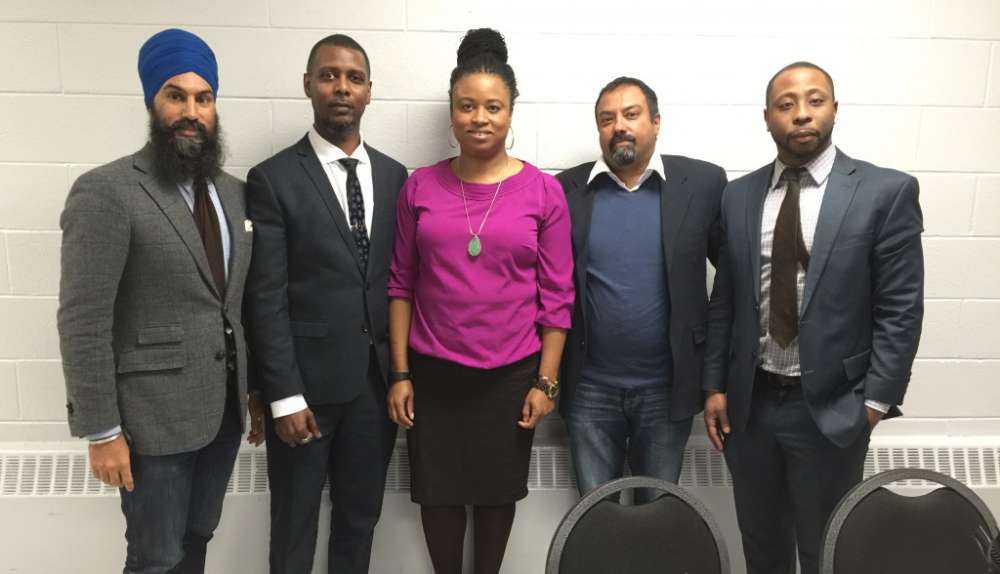on
BY ALYSSA MAHADEO
Over the years the issue of racism has caused an unsettling amount of concern in regards to how we interact with people in our society. It has been identified as the root cause of many social justice issues, a product of the race-based worldwide view of prejudice, stereotyping, and discrimination. Racism can be found in social actions, practices or political systems that support the expression of prejudice or aversion in discriminatory practices. It is the division of people into distinct groups categorized by race, and subdivided by social behavior, ranked as inferior or superior.
The practice of carding isn’t something new, and it is very familiar on the streets of Toronto. For years these random police checks have been targeting young African-Canadian men, in unjust association with criminal activity.
According to a series of investigative reports conducted by the Toronto Star, people stopped for the sake of engagement between 2008 and 2013 were more likely to be African-Canadian than white and the vast majority of encounters did not involve an arrest or charges. Nevertheless, details about each individual including one’s name, age, perceived skin colour, estimated height, and weight, and often the names of one’s friends were recorded and entered into a massive database. The Star reporters found that city police filled out at least 2.1 million contact cards involving 1.2 million people between 2008 and 2013.
On Tuesday March 22nd, the government released its final regulation on street-checks/carding in Ontario.
While this regulation is noted as a welcome and important step in the direction of increasing accountability for the prevention in Anti-Black racism in policing, this band-aid solution isn’t the ban on carding social justice groups were looking for.
NDP MPP for Bramalea-Gore-Malton, Jagmeet Singh, invited the public to a town hall meeting in Brampton to have an open discussion about the new carding regulations, and also brainstorm ways to help reduce police harassment in the Peel Region. Last year Singh voiced his concerns about the problem of carding, and how it isn’t a practice that can be regulated, but should be banned altogether. As an individual and a criminal defense lawyer who has been subjected to carding himself, he has personally experienced how this practice violated two fundamental Charter rights: the right to not be arbitrarily detained, and the right to not be subjected to unreasonable search and seizure.
Singh organized a panel of community and social justice activists that included San Grewal Urban Affairs Reporter for the Toronto Star, Anthony Morgan Policy & Research Lawyer at the African Canadian Legal Clinic, Knia Singh Law Student and Chair of CARIBANA Arts Group, Roger Love Lawyer at the Human Rights Legal Support Center and Nicole Bonnie Senior Service Manager, Community Engagement and Partnerships at Peel Children’s Aid Society. Each panelist brought their own informative and educational content regarding the issues of racial carding listing out the new regulations and what they covered.
Urban Affairs reporter San Grewal was able to provide some interesting insight on the statistics of carding within Peel Region. Based on the information and data they collected from Peel Police through the channels of gathering public information, and the freedom of information they were able to discover where specific carding stops had occurred within Peel. “By gathering this information we were hoping to locate where the specific patrol zones are in Peel, however the data we were given did not correlate that information,” explained Grewal. “Although the data didn’t reflect the patrol zones we were able to find 159,000 carding interactions between 2009-2014 by Peel Police and found that black individuals were 3.6 [times] more likely to have been stopped over that period opposed to white individuals.”
The main issue to be addressed in light of the new regulation is taking a closer look at out- of-place carding stops happening in Peel Region. Unfortunately the new government regulations are not something that can be regulated throughout the province and is relative to the practices of the regions’ police. This issue then leaves full authority in the hands of the police when it comes to how they deal with specific unwarranted carding instances.
Anthony Morgan Policy & Research Lawyer at the African Canadian Legal Clinic listed out for everyone present all 10 of the new regulations referencing what had changed from before the regulation was implemented, and also how there was still much room for improvement. “Standardization of carding is open to interpretation, lacking in language and legal terminology that draws a very thin veil over what is and what is not allowed,” says Morgan.
A few examples brought to light by the new regulations does not prompt police to properly communicate the cause for the interaction. There is clear evidence of the limitations of the regulations and the degree to which carding can take place.
The New Regulations are as follows:
- Carding Permitted During Investigation – Can ask for info without having the regulation apply during an investigation in the area.
- Regulation Permits Sharing of other individuals’ information without their knowledge – Nothing in the regulation prevents the sharing of that information and the regulation only applies when you are giving out info about yourself.
- Use of Vague Suspect Descriptions Permitted – Allows street checks to occur even on the basis of very vague identifying information of an individual.
- Weak Rights Notification – Regulation does not require that officers tell individuals at the start the reason for interaction or inform them of the right to walk away in a circumstance in which they have that right i.e not being charged with a crime or being arrested.
- Receipts without reason – Officers not required to indicate the reason for stopping and collecting data on the receipt they are required to give as proof of interaction and information collected.
- Children and youth documented without parental consent – Regulation does not allow for youth 18 and under to be informed that they can contact parent or guardian before giving out identifying information to police.
- Indefinite Data Retention – Data is always available to be accessed.
- No standardization of Data Collection – Standardization on how the data is collected in every region is different.
- Regulation Permits Carding Performance Targets for Police Divisions and Units – Incentive to collect data cards has been forbidden, regulation does not prevent individual units from this, higher carding rates get better incentives, whole units can be incentified for their benefit.
- The Absence of Training on Anti-Black Racism and Racial Profiling – Officers do not have to be trained in racial profiling, Anti Black Racism.
The most important things we can do as a community when it comes to dealing with street checks and carding is to be informed. The most valuable form of knowledge and information is stated in the Canadian Charter of Rights and Freedoms. Many of the panelists and citizens of the community who were in attendance revealed to being carded multiple times. This problem will continue for generations to come without the understanding of how or why, and knowing what rights you have in that situation.,.
In instances where you have felt that you have been stopped and carded in illegitimate circumstances there are resources at your disposal. The first thing you can do is submit an applications to the Human Rights Tribunal of Ontario if you feel you were stopped because of your race. In such instances, you will need to prove that it was a factor in the carding stop. If you aren’t sure race or religion was a factor, you can submit an application to the Office of the Independent Police Report, a check on police conduct OIPRD needs to be filed in 6 months. Ontario Human Rights Commission, has special powers and can conduct an inquiry into and individuals human rights and what is happening in Peel with HRI Human rights issues. You can also take it straight to police themselves, speak to the sergeant, if you have the badge number, start your own investigations. Lastly, an FOI request can be filed to records management, for all of the instances where you have been carded, you can get that record cleared as long as you have the evidence in hand.
It is imperative that the community continues the conversation on carding, knowing there are safe spaces in the community where we can enforce safety while also abolishing racism. Knowing our human rights, educating the younger generation and also keeping open lines of communication with the police in Peel will present the opportunity to express our concerns and understand the policies put in place to protect us. “The problem with carding is that it is confusing, advocating since 2011, it exists within a legal loophole and gray area,” states Roger Love Lawyer at the Human Rights Legal Support Center. “There is a movement happening, and it is our job to hold the government accountable.”
To find out more about the new carding regulations please visit the Ontario Ministry of Community Safety and Correctional Services at http://www.mcscs.jus.gov.on.ca/
For those interested in joining the discussion, there will be a Police Board meeting in Peel on Friday April 22nd following the theme: Action and Movement in Numbers at 10 Peel Centre Drive, Brampton at 9:30 a.m. Let us take action and help abolish racism in Peel!
Stay in the loop with exclusive news, stories, and insights—delivered straight to your inbox. No fluff, just real content that matters. Sign up today!












